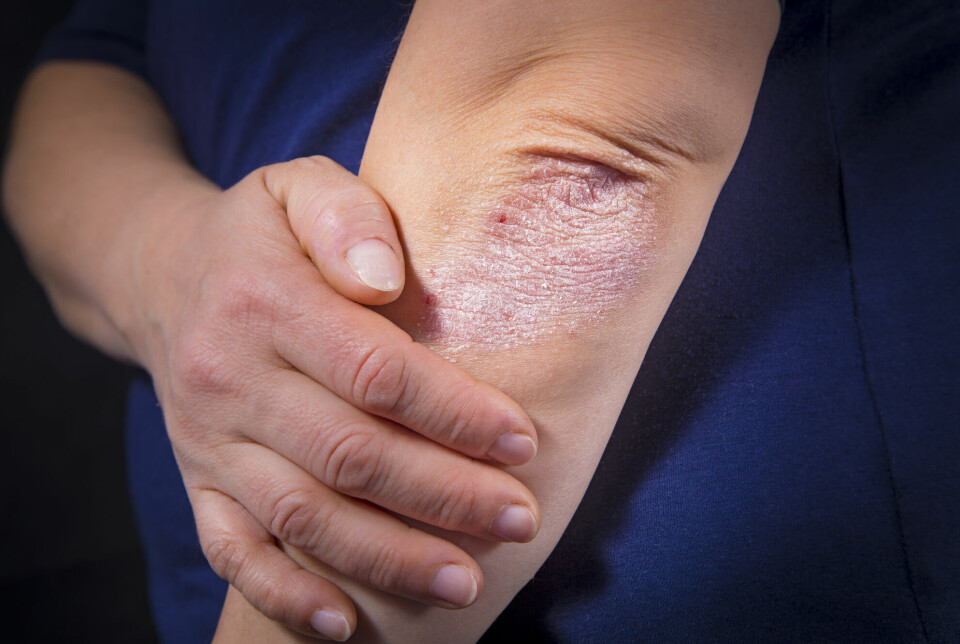
Gene testing might provide more precise treatment of arthritis, bowel disease and psoriasis
Many people with chronic inflammation have had good results using a biologic medicine. However, for some the effect gradually wears off. Now Norwegian researchers have made discoveries that could provide a more genetically tailored treatment.
Many people with chronic diseases like psoriasis have improved their lives in recent years.
That's thanks to a biologic medicine that arrived just over 20 years ago.
It is effective for a number of chronic inflammatory joint, skin and intestinal disorders. These include rheumatoid arthritis, Crohn's disease and spondyloarthritis, also known as Bechterew's.
Unfortunately for many, the medicine stops working after a while because the immune system forms antibodies. They bind to the drug and prevent it from working.
But now a new Norwegian study offers hope.

Separate gene variant found
Researchers at Diakonhjemmet Hospital and the Department of Gastroenterology at Akershus University Hospital have made promising discoveries.
They have examined the tissue type of over 600 patients who had chronic inflammatory diseases, including patients with skin, joint and bowel diseases.
“We wanted to investigate whether patients who develop antibodies against the medication have certain gene variants,” says Marte Kirkesæther Brun.
Brun is a doctor and researcher at the REMEDY Research Centre at Diakonhjemmet Hospital.
Three times the risk
The researchers’ assumption was correct. They found a link between two gene variants and the development of immunity to the TNF inhibitor infliximab.
The active substance is sold under the names Remicade, Remsima and Inflectra.
The patients who had at least one of two HLA-DQ2 gene variants had three times the risk of developing antibodies.
The study has been published in the Journal of Internal Medicine.
Got rid of pain and stiff back, but then became immune
Ketil Jakobsen has spondyloarthritis, better known as Bechterew's. A few years ago, he used one of the biologic medicines.
The effect was very good, and the stiffness and pain in his back disappeared. However, the medicine eventually lost its effectiveness. He had become immune.
The same thing happened when he tested two other medication variants. After a break, he started them again, but had a severe allergic reaction. He had to stop treatment yet again.
“I think it would be great if researchers manage to figure out who is likely to become immune, so that we can get more personalized medication,” Jakobsen says.
Currently his disease is not very active.
“But if I have to start taking medicine again, it would be really nice if my doctors would know what dose and which types of medication would reduce the risk of me becoming immune again,” says Jakobsen.
Had gene variants regardless of illness
Just over a quarter of the examined patients – 28 percent – had these gene variants.
This helps us to understand why the effectiveness of the treatment disappears for some patients, says Brun.
The findings were consistent for the various diagnostic groups that were involved, regardless of whether they had inflammatory diseases of the joints, bowels or skin.
“This result suggests that the connection is independent of diagnosis,” says Brun.
More tailored treatment
The finding provides a good starting point for a more tailored treatment of these patient groups.
“If we can test patients for these gene variants before starting treatment, we can predict who has an increased risk of the treatment losing its effectiveness,” says Brun.
Several measures can prevent the formation of antibodies against infliximab, she says.
Possible measures
Possible measures include giving high enough doses of infliximab or adding another immunosuppressive treatment.
“These measures would be extra important in patients who have the risk-gene variants,” she says.
Regular measurements of the drug's concentration in the blood are another measure. This can help ensure a high enough dose so any antibodies can be detected early.
Interdisciplinary collaboration
The researchers believe the study is a good example of how even a small country like Norway can contribute with important research by collaborating across disciplines.
“Clinicians and basic researchers have put their heads together,” says Silje W. Syversen at the REMEDY Research Centre.
The study is based on a larger project which is an interdisciplinary research collaboration.
Clinical environments within gastromedicine, dermatology and rheumatology at Akershus University Hospital (Ahus), Oslo University Hospital (OUS) and Diakonhjemmet participated.
Researchers at the Department of Immunology at OUS have contributed to the genetic analyses. Researchers in medical biochemistry at Radiumhospitalet at OUS have contributed with the analyses of infliximab and antibodies.
Reference:
Marthe Kirkesæther Brun, Silje Watterdal Syversen et.al.: HLA-DQ2 is associated with anti-drug antibody formation to infliximab in patients with immune-mediated inflammatory diseases. Journal of Internal Medicine, 2023. (Summary)
———
Read the Norwegian version of this article at forskning.no




































